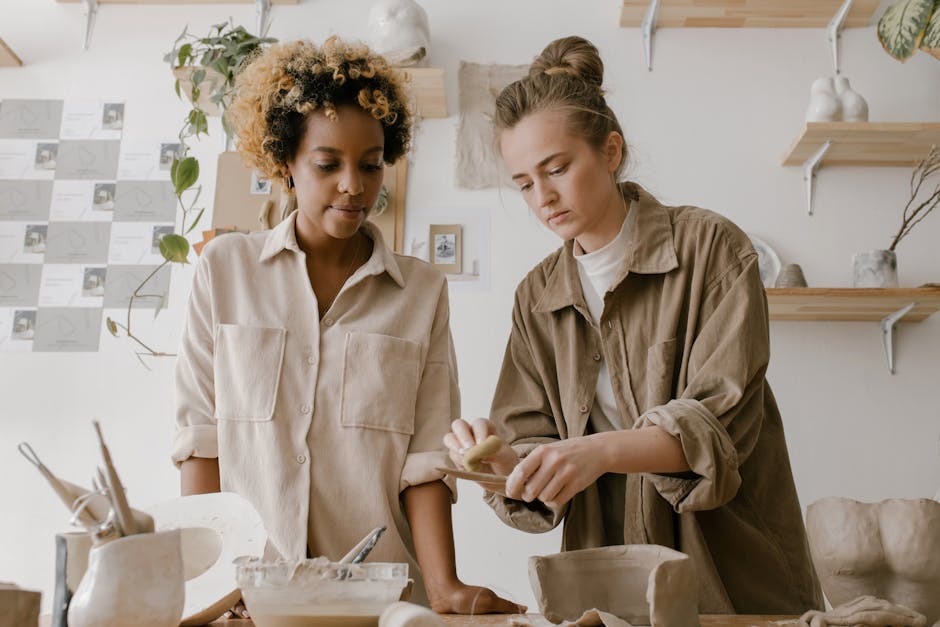The allure of crafting something tangible from clay, transforming a lump of earth into a unique piece of art, has captivated individuals for millennia. Today, the accessibility of online resources makes pursuing this ancient craft a readily achievable hobby. A burgeoning array of platforms and websites cater to every skill level, from absolute beginners to seasoned potters seeking refinement. This exploration dives into the world of online pottery learning, examining the types of resources available and their effectiveness.
A wealth of digital instruction awaits those yearning to understand the nuances of pottery. Online courses, tutorials, and communities offer structured guidance and invaluable peer support, making the process considerably more enriching and comprehensive. From fundamental techniques to intricate glazing procedures, learners can navigate these resources at their own pace, accommodating individual learning styles and schedules.
One significant category of online resources for pottery learning involves video tutorials. These visual guides, often accompanied by detailed descriptions, provide a practical and engaging approach. These tutorials frequently cover crucial aspects like wheel throwing, hand-building methods, and the use of different clays. Experienced potters often offer detailed insights into shaping, trimming, and achieving desired textures. Platforms like YouTube, dedicated pottery channels, and specialized websites showcase a vast library of these visual guides. However, the quality of these videos can vary significantly. Beginners should scrutinize the presenter’s experience and the clarity of their explanations. Verifying the information provided with established pottery books or instructors can be crucial.
Beyond visual learning, online forums and communities play a vital role in the pottery journey. These platforms often provide an invaluable space for collaboration, sharing experiences, and asking questions. Potters of diverse skill levels can interact, providing support and advice to one another. Such forums facilitate learning from other individuals’ mistakes and triumphs. The collective knowledge pool within these communities can be a powerful tool for those eager to refine their craft. However, maintaining a respectful and constructive environment is crucial for optimal learning within these forums.
Furthermore, online pottery courses are becoming increasingly prevalent. These courses frequently provide structured learning paths, offering a curated sequence of lessons covering various techniques and concepts. Platforms such as Skillshare, Udemy, and Coursera feature courses designed to guide individuals from basic techniques to more advanced ones. These courses can be a more structured approach, offering a comprehensive learning experience, with often more rigorous content and structured learning paths.
An often-overlooked aspect of online learning is the availability of digital resources like online clay supply catalogs and studio designs. These resources provide practical insights into the materials needed for pottery. These resources allow prospective potters to become acquainted with various clay types, glazing options, and tools before committing to purchases. This saves time and money, preventing unnecessary expenditures and equipping learners with essential knowledge. Furthermore, these platforms often provide studio designs, which offer inspiration and practical considerations regarding workspace design.
Despite the abundance of online resources, a crucial component remains: practical experience. Online learning is an excellent supplement, but it can’t fully replace the tactile and hands-on experience of working with clay. Ideally, learners should combine online instruction with practical sessions at local pottery studios or through workshops. This hands-on practice allows for the development of necessary muscle memory and sensory feedback, vital for mastering the art of shaping and manipulating clay. Practical workshops and studio visits can provide invaluable insights into clay variations, wheel techniques, and the nuances of firing.
However, individuals seeking guidance may also consider engaging with local pottery instructors. These mentors can offer personalized feedback and support, guiding novices through the various stages of learning. In-person instruction allows for immediate feedback, tailoring techniques to specific needs and addressing any challenges directly. A combination of online and in-person learning often yields the most effective results.
In conclusion, online resources provide an expansive gateway to the world of pottery. From visual tutorials to structured courses, digital platforms offer unparalleled access to information and community. However, it’s essential to leverage these resources strategically, supplementing them with practical experience through workshops and in-person mentorship. By combining online learning with hands-on practice, individuals can embark on a rewarding pottery journey, developing a valuable craft that nurtures creativity and fosters a profound connection with the art form. The accessibility of online resources makes pottery a rewarding and attainable hobby for virtually everyone.






